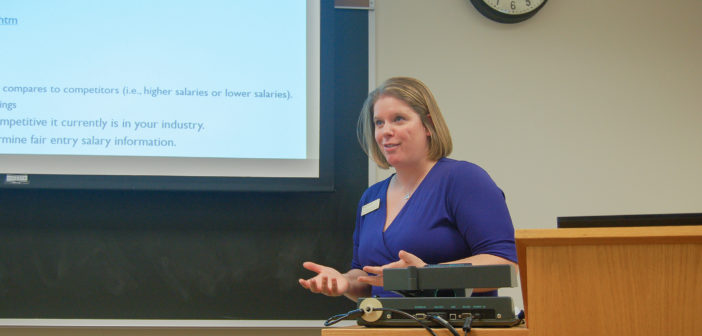This week, two Lehigh organizations teamed up to help students contextualize and combat the impact of the gender pay gap.
The Center for Career and Professional Development and the Women’s Center hosted “Negotiating the Women’s Wage Gap” on Feb. 28.
According to the American Association of University Women, median earnings for men in Pennsylvania in February were $50,976, compared to $40,214 for women — a difference of $10,762. Rita Jones, the director of the Women’s Center, said the history of the wage gap is long and complex.
“I think it has a lot to do with how society imagines people’s identities, and what they’re supposed to be good at, or what they’re not suited for,” Jones said. “When a body shows up in a space or in a role that people are not used to seeing that body in, I think there is a lot that goes into play from the people in that workspace. There’s lots of questions, there’s lots of ‘I don’t know what to expect,’ or ‘I heard that this body isn’t going to be able to do this.’ It’s really hard to account for one thing causing all these questions.”
The issue of expected gender roles also allows men and those who identify as males to disassociate themselves with the issue of the wage gap, Jones said. However, she calls for a different response from the employees on the other end of the salary spectrum.
“Even if someone says, ‘well, I identify as a man, I’m never going to have this issue,’ we still want him to think about what happens when (he’s) in the workplace and sees inequitable policies,” Jones said.
Jones said individuals on the hiring end have to think about the gender wage gap when applicants come in.
She said taking action in a workplace environment can be as easy as noticing where people sit in meetings and who tends to stick around to clean things up. For college students about to go into the workforce, Jones emphasized how important acknowledgement of the little things can be.
“Notice how different tasks are distributed,” she said. “Is there just one gender who organizes all of the office Christmas, holiday and birthday parties, and there is another gender that never does? If so, is that kind of service to the workplace counted on performance appraisals and reviews at the end of the year, or is that just considered superfluous?”
Jones said it is important to practice ways to advocate for others and learn what it means to be a good ally.
The gender pay gap is largely influenced by wage negotiation and each gender’s respective approaches in negotiating their wages. Andrea Skimbo, a career counselor for Lehigh’s career center, said negotiation is key when striving to close the gap and get a fair salary.
“My advice to women who are looking at some of those more traditional career paths is to do a lot of preparation before they go negotiate, because their leverage for negotiation is understanding what’s a fair salary,” Skimbo said. “Having that knowledge ahead of them is really what (women) need in order to begin the negotiation that helps create an equal playing field.”
Skimbo said the research needed before approaching wage negotiation includes knowledge about what a fair salary is, what the basic cost of living is in the location of the job and knowing what benefits can be negotiated outside of salary, like vacation days or insurance coverage.
Yet research alone isn’t all that is needed to successfully negotiate a change in pay. Skimbo said confidence plays a huge role in negotiations and is usually what differs between genders.
“I find in general, guys are more prepared and comfortable to (negotiate), especially if they’re talking to another male, but if a female is talking to a male, sometimes she has to get comfortable with it,” Skimbo said.
Skimbo said practicing the conversation is not just about what is being said, but feeling confident, polished and professional when getting the point across.
Jones said oftentimes women in male-dominated professions fall victim to the “imposter syndrome” and doubt their aptitude for their jobs despite earning their positions. She said sometimes women feel like they were hired through some kind of fluke or that it was luck, but they shouldn’t feel this way.
Issues like the “imposter syndrome” demonstrate the psychological impact of the wage gap and validate the worth of conversations about pay inequality.
“If a man and a woman are completing the same job just as well as one another, they should be paid the same,” said Hannah Hedstrom, ’20, an advocate for equal wages. “The wage gap is just another way of telling women they’re inferior when it’s not true.”
Skimbo said she always leaves students with one message before they leave her office.
“You don’t need to just accept whatever they give you,” Skimbo said. “You are worth it.”






Comment policy
Comments posted to The Brown and White website are reviewed by a moderator before being approved. Incendiary speech or harassing language, including comments targeted at individuals, may be deemed unacceptable and not published. Spam and other soliciting will also be declined.
The Brown and White also reserves the right to not publish entirely anonymous comments.